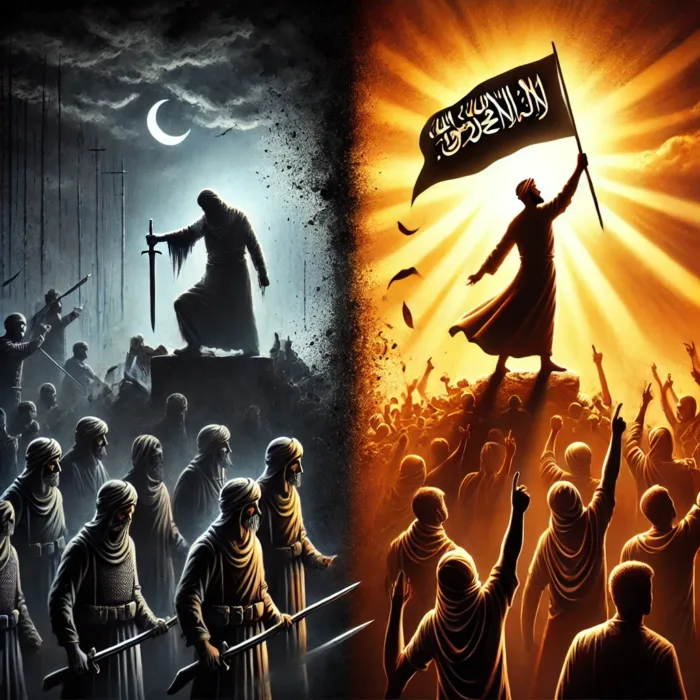Table of Contents
Introduction
The fourth article in the series, “The Era of the Rightly Guided Caliphs“, delves into the significance of Jihad in Islam. It examines Islamic history, emphasizing that strength is crucial for safeguarding and spreading the truth. The article also reflects on how neglecting Jihad results in the Ummah’s weakness and humiliation. Click here to explore the full series.
Abu Bakr’s Role in Establishing Strength Through Islamic Jihad
At the beginning of his caliphate, during his inaugural address, Abu Bakr (may ALLAH be pleased with him) profoundly stated:
“No people abandon Jihad in the path of ALLAH except that ALLAH humiliates them“
Abu Bakr’s life was closely intertwined with the pivotal moments of Islamic history. As the first man to embrace Islam, he bore witness to its emergence in Mecca, enduring alongside the early Muslims the trials of persecution, torture, and the siege. He lived through the remarkable migration (Hijrah) to Medinah.
During the Hijra, Abu Bakr experienced the descent of divine revelation and heard the reassuring words of ALLAH:
“Indeed, [O Muḥammad], HE who imposed upon You the Qur’ān will take You back to a place of return…”1
(Suraat ‘Al-QaSaS, 28:85)
He also listened to the Prophet (Peace be upon Him) give Suraqah bin Malik glad tidings, saying,
“How will you feel, O Suraqah, when you wear the bracelets of Khosrau?“2
Once in Medinah, Abu Bakr witnessed the momentous occasion when permission for Islamic Jihad was revealed. He heard the verse:
“Permission [to fight] has been given to those who are being fought, because they were wronged. And indeed, ALLAH is competent to give them victory. [They are] those who have been evicted from their homes without right – only because they say, “Our LORD is ALLAH”…“3
(Suraat ‘Al-Hajj, 22:39-40)
Abu Bakr stood by the Prophet (Peace be upon Him) in every battle, observed the conquest of Mecca with his own eyes, and watched as tribes willingly embraced Islam, pledging their allegiance to the Prophet (Peace be upon Him). He saw the transformation of the Islamic nation—from weakness, persecution, and humiliation to strength, dignity, and establishment. This transformation was achieved through Islamic Jihad, a struggle in which Abu Bakr played a significant and honorable role.
The Necessity of Strength to Uphold Truth
Is truth sufficient on its own without strength? Some may ask, “Does truth require power?” The reality is that truth must be reinforced by strength. If truth alone were enough to guide people, we would not witness the existence of tribes, clans, states, or institutions like armies, intelligence agencies, laws, walls, or fortresses. Wars and conflicts would have no place in such a world.
Imagine if all disputes could be resolved simply by sitting together, with both sides embracing the truth as soon as they recognized it. But this is not the reality. The world has developed these systems and safeguards because people do not naturally follow truth just by knowing it.
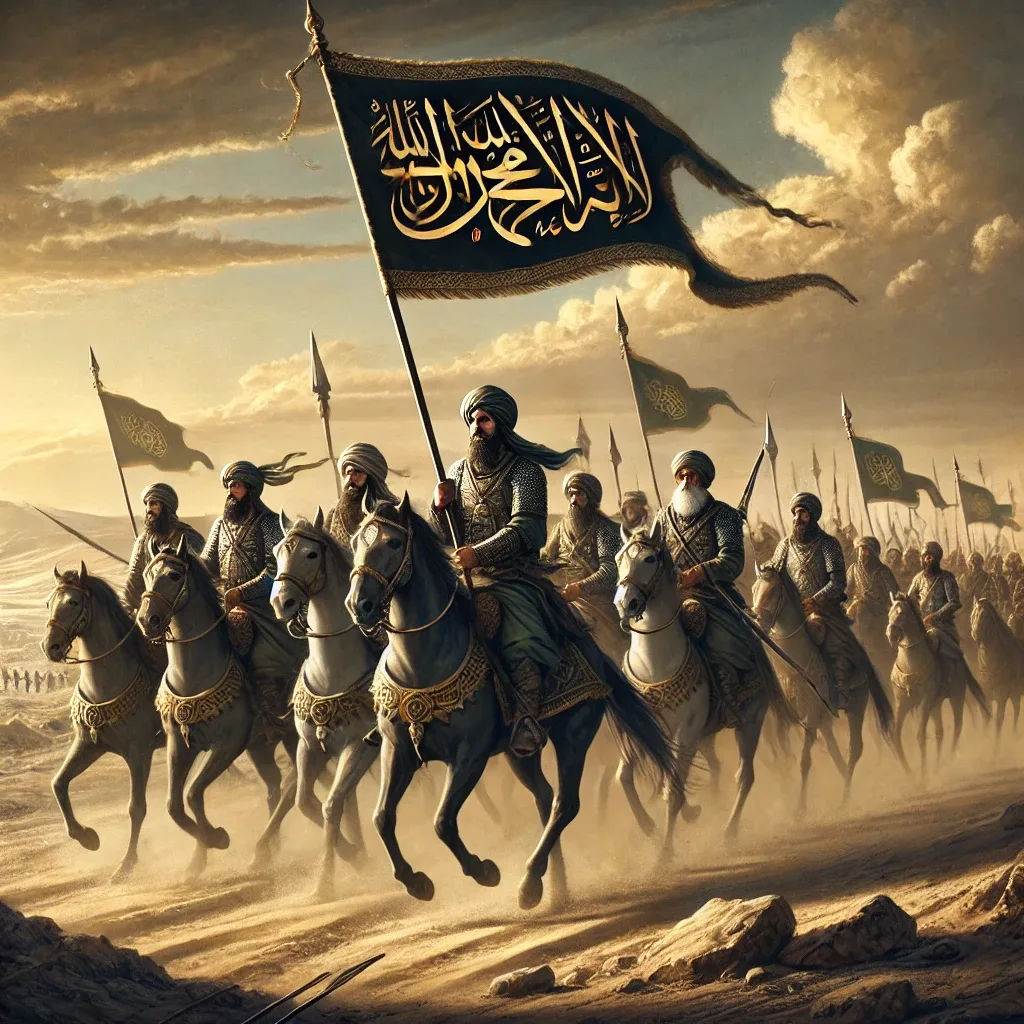
Within ourselves, we recognize this. People often commit sins, engage in disobedience, or commit crimes even though they know these actions are wrong. The truth is, only a virtuous minority aligns themselves with what is right simply because they recognize it as such. For the majority, what deters them from wrongdoing is not an inner commitment to truth but external factors—fear of consequences, punishment, or lack of opportunity.
Thus, truth needs power to safeguard it and to rescue it from the grip of falsehood, which constantly seeks to dominate and suppress it.
If this principle holds true for individuals, it becomes even more critical at the level of nations and states. The desire for authority is one of the strongest human instincts. A tyrant may destroy entire cities, eliminate hundreds of thousands—or even millions—of people to preserve their power. As the Arabs wisely said: “Kingship is barren”, for history has shown that a man may kill his own son, a son may betray his father, or a brother may turn against his sibling, all in pursuit of power.
Challenges to Truth and the Role of Authority
When plots are crafted against the powerful in matters of kingship, what then of the weak? If the thirst for power can sever ties of kinship, affection, and long-standing companionship, what hope remains for those with no status, no relationship, and no influence to protect them?
The state stands as the focal point of human ambition, representing authority so coveted that truth is often denied when it poses a threat to such authority. Many recognize the truth yet turn away from it for various reasons.
Some reject truth due to overpowering desires, as the people of Lot said to their Prophet (Peace be upon Him):
“…’Expel the family of Lot from your city. Indeed, They are people who keep themselves pure‘”4
(Suraat ‘An-Naml, 27:56)
Others resist it out of blind adherence to tradition, as ALLAH says:
“And similarly, WE did not send before you any warner into a city except that its affluent said, “Indeed, we found our fathers upon a religion, and we are, in their footsteps, following’“5
(Suraat ‘Az-Zukhruf, 43:23)
Truth is also opposed when it threatens established systems of benefit and privilege. Many acknowledge its guidance but fear the upheaval it could cause to networks of power, wealth, and status—structures often built on idolatry, economic exploitation, and social hierarchies. For example, slaves might gain their freedom, or idol-based economies might collapse. Truth, seen as a disruptor, is thus rejected, even when it is clearly recognized.
These obstacles explain why truth, when weak, draws only the virtuous few. The majority, bound by desires, traditions, or interests, refuse to align with it unless compelled by strength or fear of consequences.
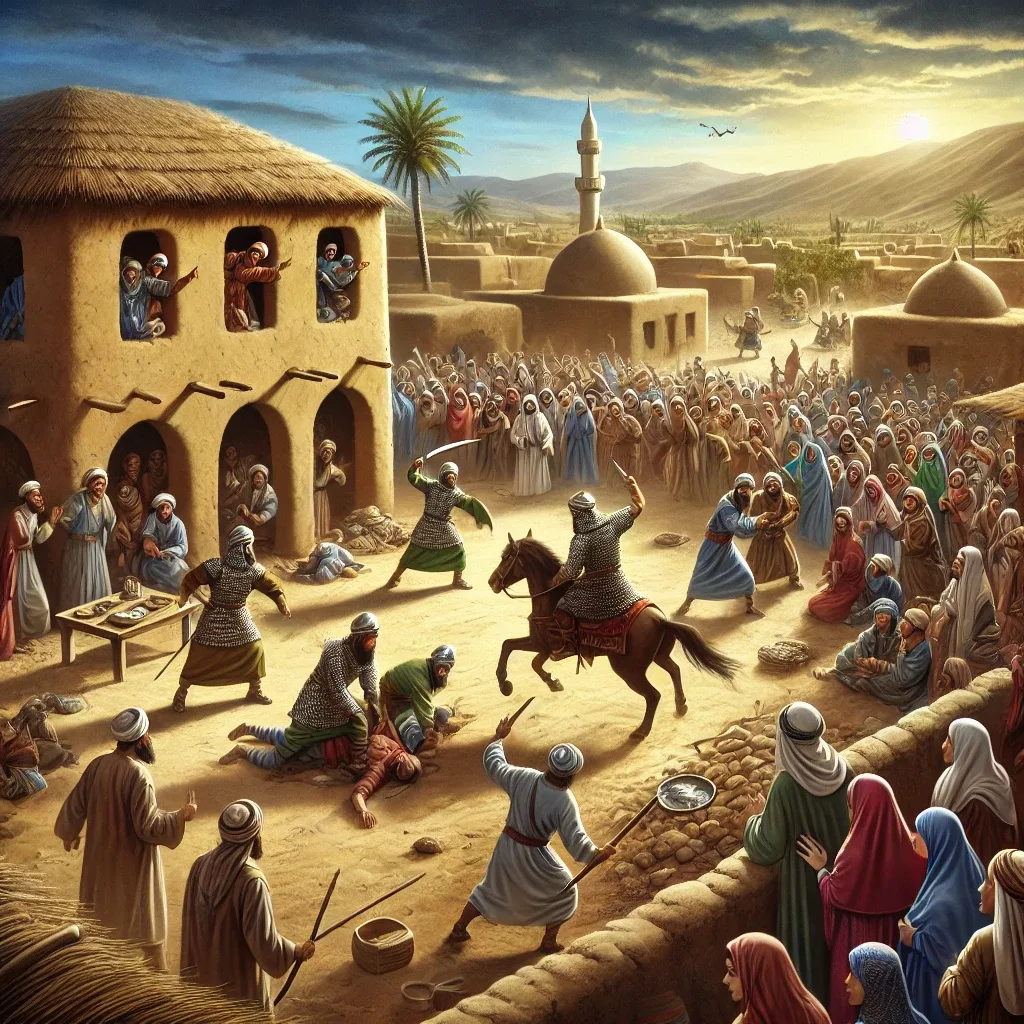
This reality was illustrated in the story of Prophet Shu’aib (Peace be upon Him), whose people said to Him:
“They said, ‘O Shuʿayb, we do not understand much of what You say, and indeed, we consider You among us as weak. And if not for Your family, we would have stoned You [to death]; and You are not to us one respected’“6
(Suraat Huud, 11:91)
Similarly, many Prophets (Peace be upon Then) faced taunts and challenges from their people:
“…’Bring us the punishment of ALLAH, if you should be of the truthful‘”7
(Suraat ‘Al-cAnkabuut, 29:29)
or,
“…‘…bring us what you promise us, if you should be of the messengers‘”8
(Suraat ‘Al-‘Acraaf, 7:77)
Their rejection even escalated to this audacious statement:
“And [remember] when they said, ‘O ALLAH, if this should be the truth from YOU, then rain down upon us stones from the sky or bring us a painful punishment’“9
(Suraat ‘Al-‘Anfaal, 8:32)
ALLAH, the Blessed and Exalted, provides a striking example in the story of the Children of Israel. Even after being freed from Pharaoh’s tyranny by Prophet Moses (Peace be upon Him), they resisted complying with divine laws until ALLAH raised Mount Tur above them as if it would fall. Only then did they submit, fearing imminent destruction. Without such compelling force, they repeatedly rebelled, even against their prophets.
The Prophet (Peace be upon Him) said:
“The Children of Israel were governed by prophets; whenever a prophet died, another succeeded him…“10
When their Prophets were strong and ruled with authority, their society remained stable. But when their Prophets were weak, ALLAH’s words describe their response:
“But is it [not] that every time a Messenger came to you, [O Children of Israel], with what your souls did not desire, you were arrogant? And a party [of Messengers] you denied and another party you killed“11
(Suraat ‘Al-Baqarah, 2:87)
The Role of the Rightly Guided Caliphs in Understanding the Importance of Jihad in Islam
The Rightly Guided Caliphs, having witnessed Islam’s journey from its earliest days, deeply understood the challenges the Prophet (Peace be upon Him) faced in delivering the message of truth. All of them, except Umar (who embraced Islam slightly later), were among the first to accept the call of Islam. They observed firsthand how the Quraysh of Mecca rejected the Prophet’s (Peace be upon Him) message, even while recognizing it as truth.
The Prophet (Peace be upon Him), known among His people as “the truthful and trustworthy“, was suddenly labeled a soothsayer, magician, liar, and madman by those same individuals. They accused Him of sowing division between husband and wife, father and son. Despite knowing the integrity of His character and the truth of His message, they offered Him wealth, women, power, and even medical help in exchange for abandoning a message they saw as a threat to their authority. Their denial stemmed not from doubt but from arrogance and fear of losing their influence, as ALLAH describes:
“And they rejected them, while their [inner] selves were convinced thereof, out of injustice and haughtiness…”12
(Suraat ‘An-Naml, 27:14)
This hypocrisy was evident to the Rightly Guided Caliphs. They saw how some among the Quraysh were inwardly convinced of the truth yet refused to accept it, driven by pride and self-interest. They also witnessed the remarkable transformation of Islam—from a persecuted minority to a strong and flourishing state—through the struggle of Islamic Jihad. It was this understanding that brought clarity to Abu Bakr’s (may ALLAH be pleased with him) famous words: “No people abandon Jihad in the path of ALLAH except that ALLAH humiliates them“.
Jihad in Islam has always stood as the ultimate revolution of the Muslim ummah. As Professor Jalal Kishk (may ALLAH have mercy on him) profoundly stated, “Jihad is our permanent revolution”. This principle has consistently made Muslims steadfast opponents of tyranny and oppression throughout history.
The Colonial Assault on Islamic Jihad and Its Legacy in the Muslim Ummah
Since the time oppressors ruled over Muslim lands and colonizers invaded, relentless efforts have been made to strip the concept of Jihad from the Islamic nation.
When the British colonized India, they installed agents as leaders of religious factions who promoted obedience to the ruler—even if that ruler was a non-Muslim colonial authority—seeking to remove the spirit of Jihad from the hearts of the people. Similarly, when Napoleon invaded Egypt, he falsely claimed to be a friend of the Ottoman Sultan, professed a supposed conversion to Islam, and declared his respect for the Quran and Islam, all in an attempt to weaken the resolve for Islamic Jihad among Muslims.
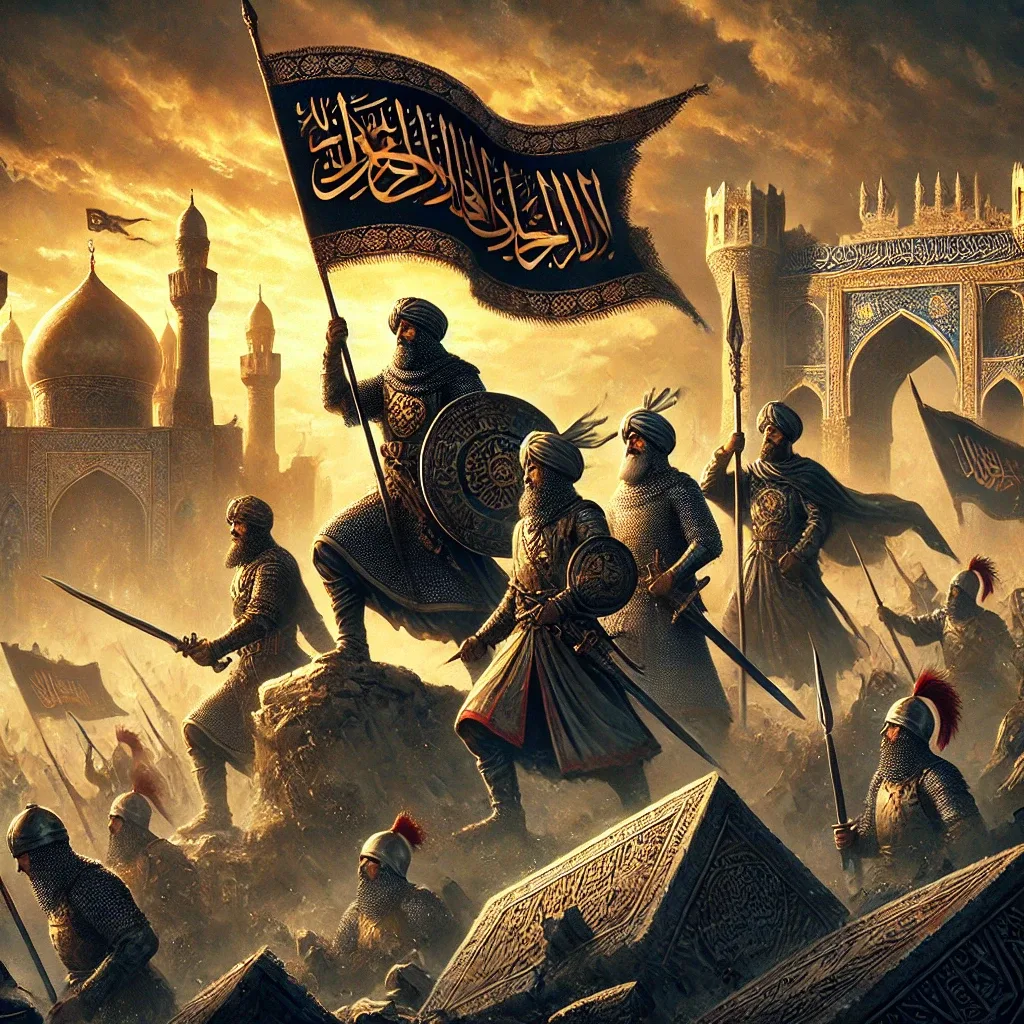
Through education systems and media, these forces have continued to distort the concept of Jihad, erasing the stories of the Mujahideen from the collective memory. Their goal has been to raise a generation that no longer sees Islamic Jihad as a fundamental duty of the Islamic state. Yet the reality, as seen in the Prophet’s (Peace be upon Him) biography, is that Islamic Jihad has always been a core responsibility of the Islamic state since the revelation of ALLAH’s words:
“Permission [to fight] has been given to those who are being fought, because they were wronged…“
(Suraat ‘Al-Hajj, 22:39)
This legacy persisted until the Prophet (Peace be upon Him) passed away, leaving behind clear guidance. His final instruction emphasized the importance of Jihad: “Send forth Usama’s army, send forth Usama’s army“13. Usama’s army was a Muslim force tasked with confronting the Romans—the preeminent superpower of that era.
Choosing weakness is, in essence, surrendering control over one’s own decisions and leaving them in the hands of others.
The Three Fronts of Islamic Jihad: Establishment, Expansion, and Civilization
Examining the biography of the Prophet (Peace be upon Him) and the history of the Rightly Guided Caliphs, we observe that Muslims engaged in Jihad on three distinct fronts:
The First Front:
Establishing, securing, and fortifying the Islamic state. This began during the Prophet’s (Peace be upon Him) lifetime, from the time of His migration to Madinah until His passing. It continued with Abu Bakr’s leadership, particularly when he fought against the apostates and those who refused to pay zakat, and later with Ali, who confronted those who rejected his legitimacy as the rightful imam obligated to be obeyed.
The Second Front:
Expanding the Islamic call through conquest and spreading the message of Islam. This took place during the caliphates of Abu Bakr, Umar, and most of Uthman’s era, a period marked by unprecedented conquests. These expansions astonished historians and orientalists alike for their speed, scale, and impact.
The French orientalist Édouard Perroy described this phenomenon, saying:
“Islam appeared like a blazing meteor, bewildering minds with its swift conquests and the vast empire it established. We find ourselves before a people who were, just yesterday, unknown and obscure, suddenly unified under Islam’s crucible. This new religion, originating from Arabia, launched armies that swept through the Sassanid Empire in a matter of years, toppling its foundations. Its banners flew over the Byzantine Empire’s provinces in Asia and Africa, leaving only a small section of western Asia Minor untouched”
He continues:
“In a remarkably short time, these armies gained control of most of Spain and Sicily and, for varying periods, seized provinces in western and southern Europe. They pushed to the borders of India, China, Ethiopia, and Western Sudan and posed an imminent threat to Gaul and Constantinople. States collapsed before the Islamic Arab thrust like nests, and crowns fell from the heads of kings like prayer beads when their string breaks. Religions that once governed peoples from the Syr Darya to Senegal melted like wax before fire.
When the dust of these conquests and the clash of swords settled, what emerged was an extraordinary empire, an unmatched civilization, and a unique culture. This new Islamic world not only surpassed its contemporaries in scope and influence but also became a cornerstone upon which the West would later build its own progress. Islam infused new life into the dormant fragments of ancient human heritage, reviving them and transforming them into something vibrant, radiant, and profoundly impactful“
The Role of Islamic Jihad in Liberating the Oppressed
Muslims carried the mission of liberating the oppressed from the grip of tyrants, guided by ALLAH’s command:
“And what is [the matter] with you that you fight not in the cause of ALLAH and [for] the oppressed among men, women, and children who say, ‘Our LORD, take us out of this city of oppressive people and appoint for us from YOURSELF a protector and appoint for us from YOURSELF a helper’?“
(Suraat ‘An-Nissaa’, 4:75)
With these words as their banner, Muslim ambassadors set forth, proclaiming:
“ALLAH has sent us to bring people out from the worship of servants to the worship of ALLAH, from the constraints of this world to the vastness of this world and the Hereafter, and from the injustice of religions to the justice of Islam“
Had it not been for Islamic Jihad, humanity might still be shackled by idolatry, superstitions, or the worship of kings and rulers. But through the determination and sacrifices of the Mujahideen, many peoples were liberated, and the blessings of Islam reached us today through the efforts and struggle of those who fought in its cause.
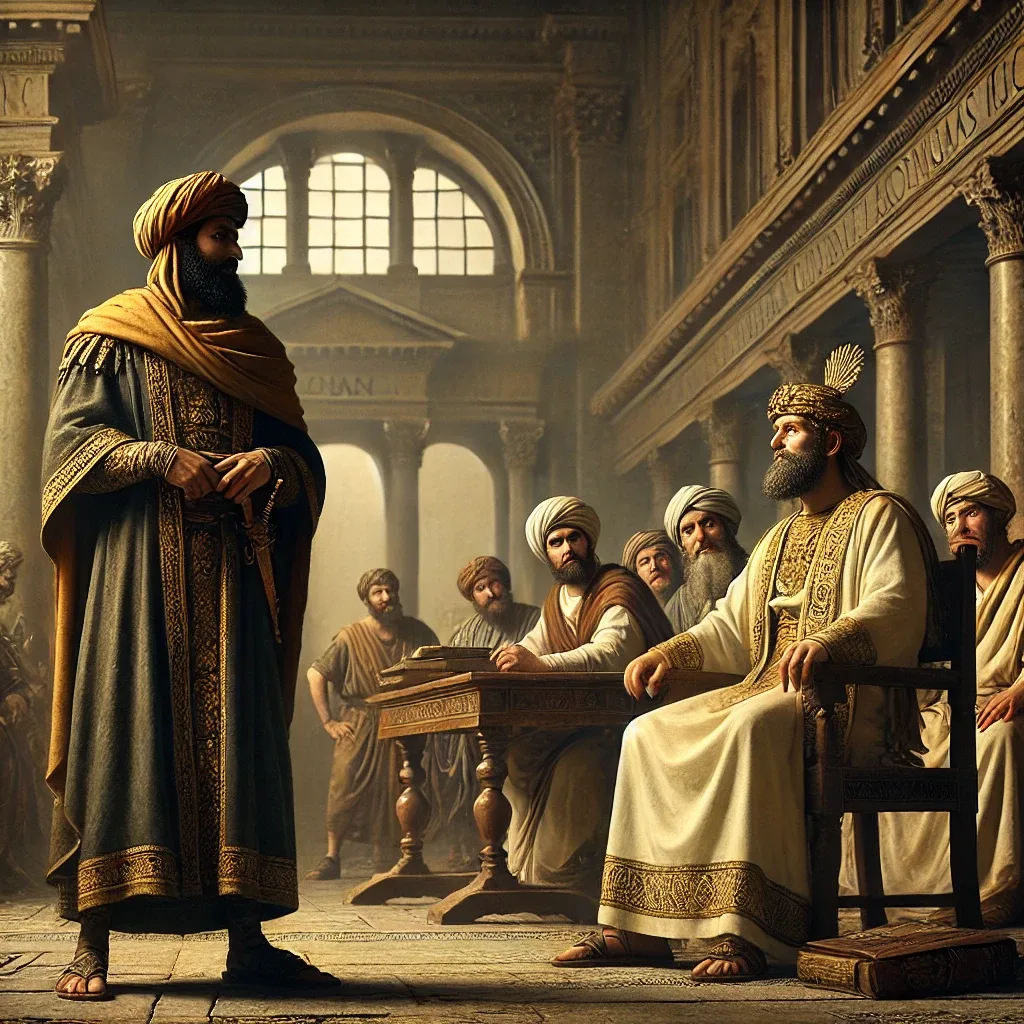
The Mujahideen carry immense weight in the balance of deeds, for it is through their efforts that ALLAH opened sealed hearts, unveiled blind eyes, and unlocked deaf ears to the truth. Imam Ibn Atiyya Al-Andalusi, in his renowned tafsir, emphasized:
“Jihad is obligatory upon Muslims, except when an enemy descends upon Muslim lands; then Jihad becomes individually obligatory”
Similarly, Ibn Taymiyyah (may ALLAH have mercy on him) stated:
“As for repelling an aggressor who corrupts both religion and worldly life, there is no duty more binding after faith in ALLAH than repelling him”
May ALLAH, the Almighty, teach us what benefits us, allow us to benefit from what HE has taught us, and increase us in knowledge and understanding.
Sources:
- Mohamed Elhamy. محمد إلهامي | عصر الخلافة الراشدة | 4. مكانة الجهاد في السياسة الإسلامية. YouTube Video.
- Saheeh International translation ↩︎
- Al-Isabah fi tamyiz al Sahabah ↩︎
- Saheeh International translation ↩︎
- Saheeh International translation ↩︎
- Saheeh International translation ↩︎
- Saheeh International translation ↩︎
- Saheeh International translation ↩︎
- Saheeh International translation ↩︎
- Saheeh International translation ↩︎
- Sahih al-Bukhari & Sahih Muslim ↩︎
- Saheeh International translation ↩︎
- Saheeh International translation ↩︎
- Fath Al-Bari ↩︎

